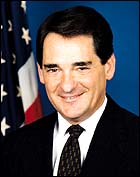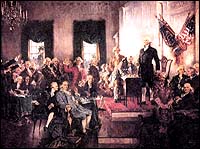
Tax Consumption Instead of Income

| ||
 |
“Our founding fathers insisted on the use of indirect taxes on individuals and specifically forbade direct taxes like the income tax. They did this because they were students of history and they knew that every despotic country had one thing in common – direct taxation which helped enslave the people.” |
What would
life be like
without an
income tax?
By Rep. Billy Tauzin

uch has been said about “consumption taxes”—taxes on spending as opposed to income or savings—in debates on tax issues. But I think the fundamental concept, which is both simple and brilliant, is widely either not understood at all or seen only in the abstract.
By getting down to brass tacks, I hope to change that here; and, for those of you who already have some understanding, hope to leave you with some useful facts.
Alexander Hamilton wrote in Federalist Paper XXI, “It is a signal advantage of taxes on articles of consumption that they contain in their own nature a security against excess. They prescribe their own limit, which cannot be exceeded without defeating the end proposed—that is, an extension of the revenue.”
All taxes reduce our ability to consume and could thus be called “consumption taxes.” Everyone I know intends to consume all the money they make, now or in the future. Some of us want to defer the consumption until we retire or until our kids are ready to go to college. Others want to consume a part of their earnings by donating it to a church or other organization. Others just use their earnings to consume today. However, anything we decide to do with the money we earn is consumption. But how does this relate to taxation?
Anytime government taxes away part of my money, it is reducing my ability to consume. Therefore, a 15 percent tax withheld from my income reduces—by 15 percent—the money I have to use for consuming goods and services. For example, to purchase a $10 item of clothing with an income tax of 15 percent, I would actually have to make $11.80, pay 15 percent of this amount or $1.80 of income tax, and then use the remaining $10.00 to purchase the clothing.
With a 15 percent national retail sales tax, I would have to earn $11.50 in order to pay the $1.50 in national retail sales tax and net the $10.00 needed to buy the article of clothing. In the case of an income tax or of a national retail sales tax, the taxes reduced my ability to consume because I have fewer dollars to use for consumption.
So, the question is this: If all taxes are really consumption taxes, shouldn’t we replace the present income tax system with a national retail sales tax that accomplishes the following:
1. Frees individuals from filing any type of federal competitors’ exports tax returns. In 1996, there were 120,000,000 1040 individual income tax returns filed. 120,000,000 Americans were forced to spend in excess of 2 billion hours trying to calculate the amount of income taxes owed to the federal government. This is absurd.
The national retail sales tax requires no federal individual tax returns of any kind. Individual Americans will pay their taxes when they make purchases of retail goods and services. No receipts, no guilty until we can prove our innocence, no tax returns, no audits, no hassle. What a concept!
2. Requires only simple returns from retail businesses. Does anyone believe that businesses “pay” taxes themselves? A business’ taxes are passed through to the consumer through higher prices and then paid to the government. All taxes are ultimately paid by consumers. In fact, many economists believe that prices of consumer goods and services are between 12 percent to 20 percent higher than they otherwise would be because of our ridiculous income tax system.
With a national retail sales tax all this changes. Because the tax will be collected by businesses selling retail goods or services, these are the only businesses which will file sales tax returns, and they will be simple. In addition, in the bill we are proposing in Congress, retail businesses are entitled to be reimbursed a fee of about 1 percent of the retail sales tax they collect. No longer will the compliance costs and the actual income tax itself have to be passed on to you and me in the form of higher prices. Through competition, the savings to business will be passed on to us and we can expect retail prices to actually decrease.
With a national retail sales tax all this changes. Because the tax will be collected by businesses selling retail goods or services, these are the only businesses which will file sales tax returns, and they will be simple. In addition, in the bill we are proposing in Congress, retail businesses are entitled to be reimbursed a fee of about 1 percent of the retail sales tax they collect. No longer will the compliance costs and the actual income tax itself have to be passed on to you and me in the form of higher prices. Through competition, the savings to business will be passed on to us and we can expect retail prices to actually decrease.
3. Abolishes the IRS and tears the income tax out by the roots. It has often been said, with some truth, that Washington has messed-up priorities. We have 24,000 employees in the FBI to fight crime and terrorism. There are 6,700 employees in the Drug Enforcement Administration to combat the polluting of our children and country by drug dealers. The Border Patrol has 5,800 employees who are supposed to protect our borders. How in the world do we justify the IRS having 111,000 employees?
Unlike the other income tax-based alternatives to the income tax, the national retail sales tax is the only proposal that will abolish the IRS and tear the income tax out by the roots. The tax will be collected by the states which already collect state sales taxes, at a fraction of the cost for collection of our present income tax or of any other proposed system.
4. Increases our competitiveness in the world economy. The income tax seriously harms our ability to compete in the global marketplace. Our major trading partners around the world rely heavily on consumption taxes that are applied to all products sold in their countries, whether domestically made or imported, and are “border-adjustable,” meaning that the taxes on exported goods are rebated to manufacturers within their borders.
|
Why is this important? It is estimated that each $1 billion in exports supports 19,000 jobs in the U.S. While our competitors’ exports range from 15 percent to 30 percent of their Gross Domestic Product, our exports only total 6 percent of U.S. GDP. By increasing exports, the U.S. can create hundreds of thousands of the type of high-wage jobs that our country desperately needs.
With the national retail sales tax, our international competitiveness will be greatly enhanced. The national retail sales tax is only levied on sales in the U.S. Our exports will pay no U.S. tax nor include U.S. taxes in their prices. Imports into our country that are sold at the retail level will be taxed in the same manner as U.S. retail products.
5. Ensures that the members of the underground economy pay their share. Using IRS estimates, the underground economy has grown at a rate of almost 8 percent per year since 1965 and is the fastest-growing segment of our economy. The IRS estimates that $216 billion in taxes went uncollected in 1996, but many analysts believe that estimate is too conservative.
The underground economy encompasses not only illegal sources of income, such as drug dealing, gambling and prostitution, but also the average, ordinary citizen who accepts a lower price for cash payments and doesn’t report the income; the businessman who keeps two sets of books and pockets a portion of the sales or takes improper deductions; or the self-employed person who charges personal expenses through the business.
Will there be people who try to evade the national retail sales tax? Yes. There are always going to be people who refuse to pay any tax. However, it is much more difficult to avoid the national retail sales tax than an income tax.
6. Eliminates the taxes on work, investment and savings. Most legislators understand that taxing something will produce less of it. By eliminating the income tax which penalizes work, investment and savings, we will get more work, investment and savings.
There will also be what some economists call the “sponge effect.” The U.S. is the world’s largest market and has the best infrastructure of any country on Earth. When the income tax is replaced with the national retail sales tax, it will become the world’s largest tax haven and a “sponge” for capital from around the world. According to Martin Armstrong of the Princeton Economic Institute, replacing the income tax with a national retail sales tax will create an inflow of foreign capital into this country like we have never seen. Mr. Armstrong points out that the nearest comparable period in modern history was in 1940. Seeking to avoid the ravages of World War II, capital flooded into the United States and government bond rates were at 1 percent.
A conservative estimate is that the adoption of the national retail sales tax will lower interest rates between 200 and 300 basis points. In short, the United States will experience the greatest economic boom in history.
7. Requires illegal immigrants and importers to pay taxes in the U.S. Not only do we fail to enforce the laws with respect to our borders, we also allow illegal immigrants to work in our country and, because they work for cash, to pay no taxes to our federal government. If we adopt a national retail sales tax, then each time illegal aliens make purchases they will pay a federal tax. This will not cure our illegal immigration problem but it will ensure that everyone living in our country contributes to paying our government’s expenses.

|
8. Empowers all Americans by giving them the choice as to how much tax they pay. Our present income tax system takes our money through withholding before we receive it. Most of us now consider that our wages are really the “take home pay” that we get after all the deductions. Under the present system, it doesn’t matter if one of us is more frugal than the other because we all pay the same amount of tax. In fact, if we are more frugal than our neighbor we are actually going to pay more and more tax because our earnings on our savings will be taxed each year.
With the national retail sales tax we receive all of the money we earn. Our checks are increased by the amount previously deducted for federal income tax. With this money in hand, we have the power to determine the amount of federal tax we pay based on how much we choose to spend. Citizens, not some bureaucrat or lawmaker in Congress, will have the power.
Our founding fathers insisted on the use of indirect taxes on individuals and specifically forbade direct taxes like the income tax. They did this because they were students of history and they knew that every despotic country had one thing in common—direct taxation which helped enslave the people. We have an opportunity to eliminate the income tax, the IRS, tax returns, audits and the penalties on our exports, work, savings and investments and replace them with an indirect national retail sales tax. For ourselves, our children and grandchildren we must free America from the income tax.
Congressman Tauzin (R-La.) is the co-author of H.R. 2001, the National Retail Sales Act. For more information on the National Retail Sales Tax, contact Citizens for an Alternative Tax System, (800) 767-7577.

